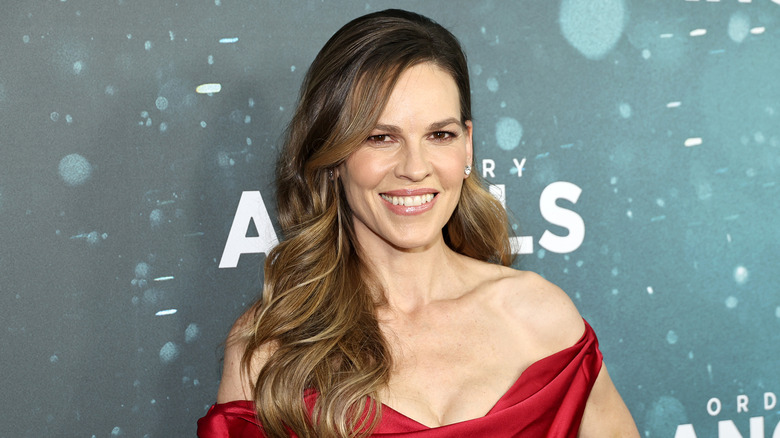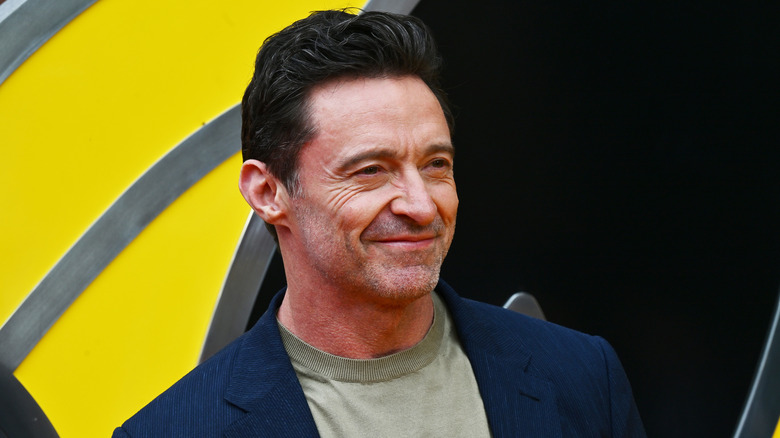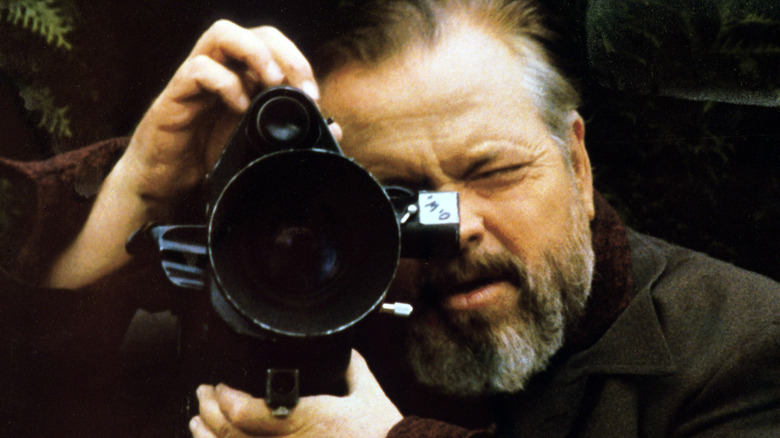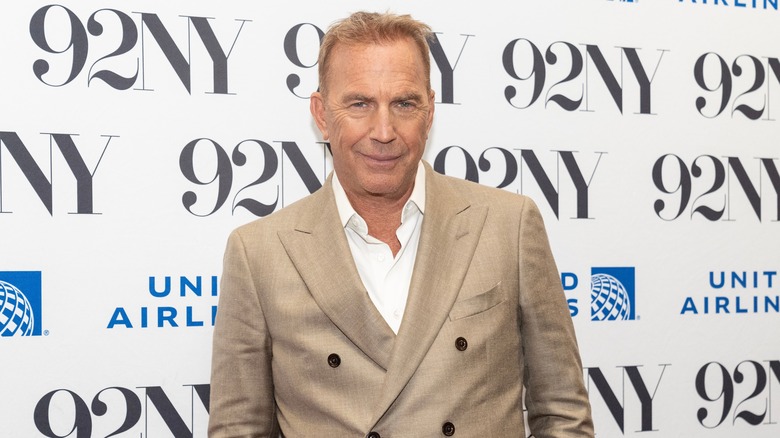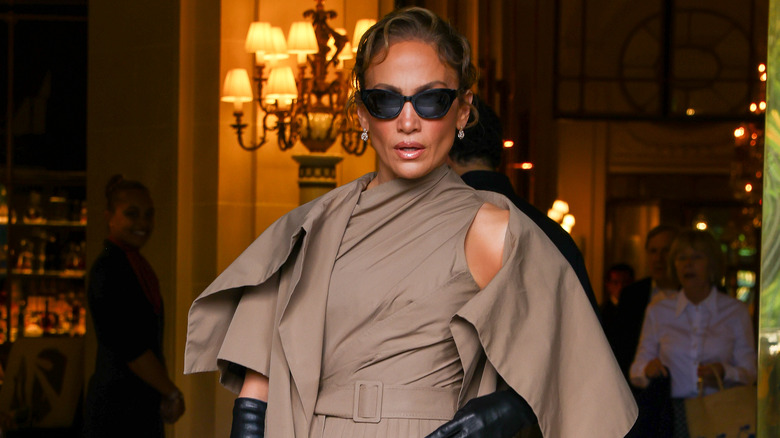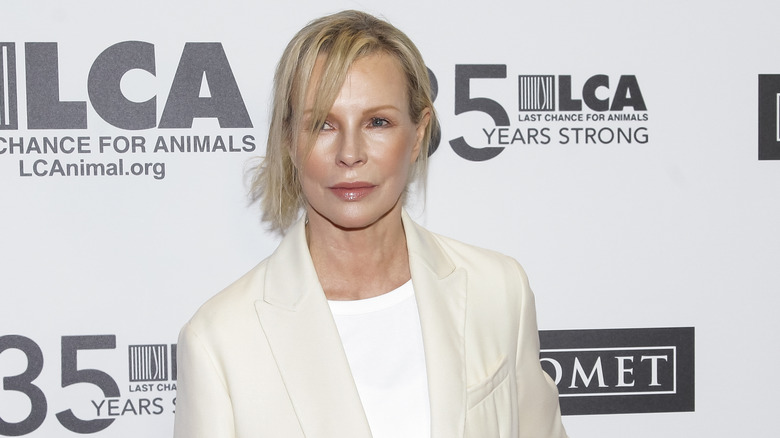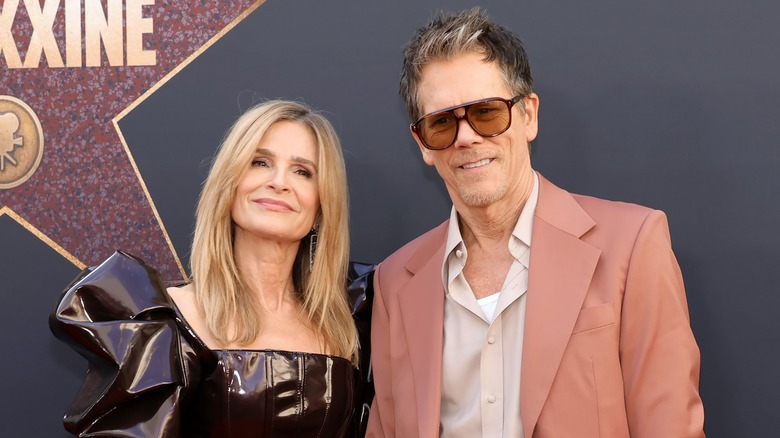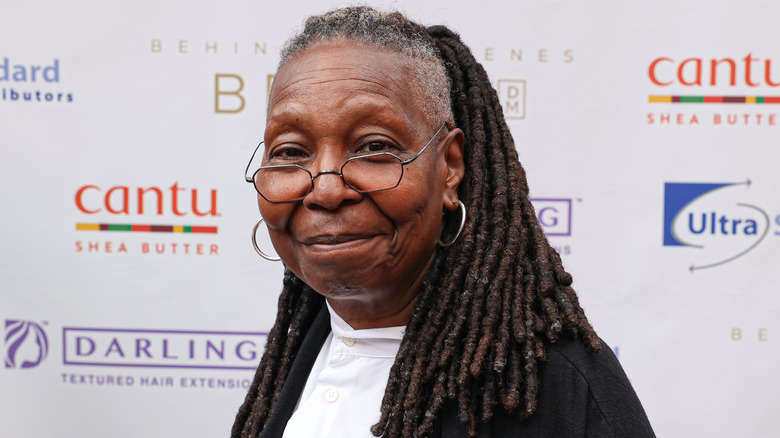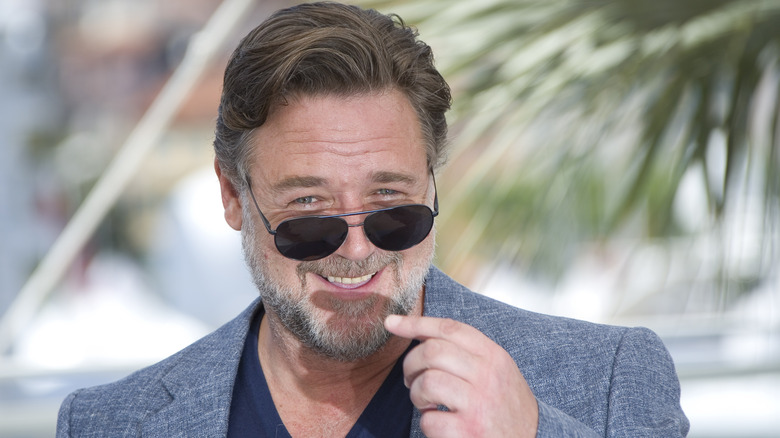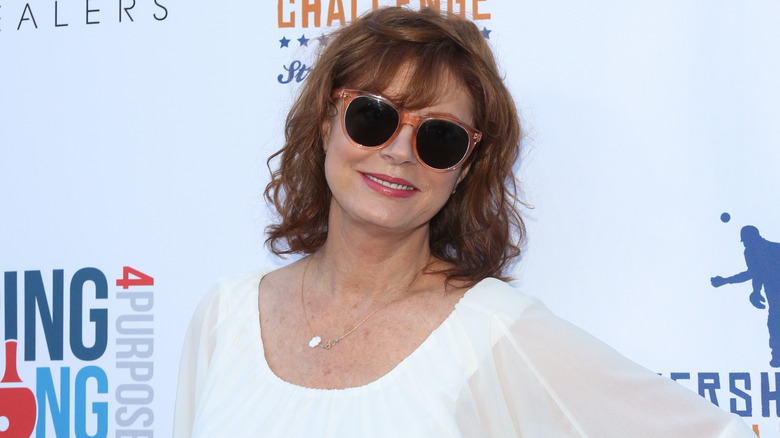The Weirdest Things Actors Have Done For Money
Thanks to the capitalist hellscape most people in the world have been living in for the past 70 years or so, there's often no shortage of things that anyone would do for money. Many people subscribe to the idea that anything that can be commodified should be commodified and that there is very little room for ethical consideration in the pursuit of capital. People who already have a fair bit of money or assets are often advised to diversify their portfolios and pursue multiple income streams, and it is usually this strategy that has lead to some of the silliest attempts by famous actors to make their money into more money.
Some actors created alcohol brands, while others run candy shops, farms, or mobile companies. Other actors do far more unpleasant things for money, like gigs for uncouth people. Some actors did strange or unpleasant things to stay afloat long enough to get their big breaks in Hollywood. Still others have found ways to turn personal issues and obsessions into lucrative opportunities. Actors don't build careers and resumes like many other professionals, and often their success is far more tenuous. Because of their natural skills in charm and gregariousness and the limited financial security to be found in their field, it makes sense that actors have some of the most interesting tales of unconventionally pursuing capital. These are the weirdest things actors have done for money.
Hilary Swank attended a party in Chechnya for a dictator
Since his rise to the highest position of power in the Chechen Republic, Ramzan Kadyrov has been linked to numerous human rights violations and suspicious deaths and has shown himself to be an angry, violent, sexist, homophobic man entirely at the beck and call of Vladimir Putin. In 2011, when Hilary Swank was paid to attend a "city day" celebration for Kadyrov, most of the Chechen dictator's unsavory acts and qualities were well-known to the world. At the event (Which was also attended by singer Seal and fellow actor Jean-Claude Van Damme, among others), Swank gave a positive speech at the event in which she acknowledged that "city day" is also Kadyrov's birthday, adding that she knew this to be the case because "I read. I do my research."
Though apparently she didn't do enough research to know that getting paid to celebrate Kadyrov is the kind of thing that might get a famous actress in trouble. After receiving major criticism for being paid to attend the Chechen event, Swank apologized to Jay Leno on "The Tonight Show," fired her CAA manager, donated her appearance fee to charity (though she never provided proof of this despite a request from the exiled Chechen prime minister), and was dropped by her publicists at 42 West. The incident affected her reputation in Hollywood and likely contributed to her career fizzling out this past decade. Swank has never admitted how much money she made for attending the Chechen event, but it's likely to have been about six figures.
Tom Hiddleston sold Centrum
If you've ever wondered whether an ad where Tom Hiddleston pretends to be a woman's thoughtful husband might be effective in selling Centrum to consumers in China, then you're not alone. In the Centrum ad that Hiddleston actually did film, he cooks and serves breakfast— an over-easy egg on salad, to be specific — to ... someone. The camera seems to be from the perspective of a woman (the Centrum vitamins in the commercial are labelled "for women") who is important to Hiddleston, most likely a wife or relative. Hiddleston gives over the breakfast and apologizes for needing to be away so much, but promises that he'll "make it up to you."
The ad ran in 2019 for Centrum's East Asian marketing campaign and did quite well there according to the ad's response from consumers on China's social media platform, Weibo. There was a less-than-positive response from folks in the United States and Britain who also saw the ad, many calling it "creepy" and "uncomfortable." Luckily for Centrum and Hiddleston, the ad isn't meant for Western audiences, and many audiences in China, especially women, appreciated the novelty of being served food by a famous handsome actor.
Hugh Jackman clowned around
Hugh Jackman is multitalented. Not only has Jackman enjoyed international fame as the star of Fox's "X-Men" film franchise, but he's also won a Tony, an Emmy, and a Grammy — thanks in large part to his impeccable singing and dancing skills on display in projects like "The Greatest Showman" and "Les Misérables." He's even been acknowledged by many as one of the nicest people in show-business. But he came a long way from humble beginnings, and Jackman's road to blockbuster success with Wolverine is paved with a lot of cruddy jobs.
On "The Howard Stern Show," Jackman once talked about how he used his many talents to make money before he found success as an actor and performer — as a birthday clown. Was he a good clown? "[I was] good up until the age of 3," Jackman said. "You could climb on my head. I could juggle three things. I could juggle kind of anything. ... But nothing more. No balloon animals, no magic tricks, nothing." He was realistic about the job's requirements: "You're being hired so the parents can just drink for an hour." The last clowning gig he had, he said, was a party for an 8-year-old. The kid was so unenthused about Jackman's clown act that the only way for Jackman to satisfy his audience was to allow the children to throw eggs at him and physically beat him for over 10 minutes.
Orson Welles voiced Unicron
"Citizen Kane" filmmaker Orson Welles had long since retired from most of his professional pursuits by the time he was 70 in 1985, but he still occasionally took a gig or two in order to make a paycheck. One of the most surprising gigs he did just for the money came in the 1980s as the voice of the antagonist, Unicron, in the film "Transformers: The Movie."
Talking about his role in the animated film, Welles reportedly said (via Slate), "I menace somebody called Something-or-other. Then I'm destroyed. My plan to destroy Whoever-it-is is then thwarted and I tear myself apart on the screen." It's clear that the veteran actor found Unicron to be a far less stimulating role than say, Othello or Falstaff, and unfortunately he didn't even have time to enjoy the fruits of his labor. Welles died five days after finishing his work for "Transformers: The Movie."
Kevin Costner blew $24 million on unusable oil spill-cleaning tech
Kevin Costner has never shied away from political issues despite his lack of expertise in anything other than acting. It makes sense, then, that a wealthy, outspoken artist like Costner might try to combine his political views with his desire to make money, and that's exactly what he did with Ocean Therapy Solutions.
With an excess of wealth and inspired both by his certified box-office bomb "Waterworld" and his dismay upon witnessing the ineffective ocean clean-up efforts following the Exxon Valdez oil spill disaster of 1989, Costner pursued the development of a new technology to separate oil from ocean water with a company called Ocean Therapy Solutions (OTS). He pumped $24 million of his own fortune into the company. The machines that OTS produced were basically centrifuge generators that, after an ocean-based oil spill, would cleanse the water of crude oil while maintaining the usability of said oil. It sounded great and everyone from big oil companies to locals living near ocean-based oil rigs were excited to see the tech in action.
Unfortunately for Costner and his OTS partners, their opportunity to swoop in with their MacGuffin-esque technology came too late in the development stage after the BP oil spill in 2010. BP reached out and purchased a number of OTS' centrifuge devices for clean-up, but between a lack of successful testing and adequate transport logistics, the technology ultimately proved expensive and unusable.
J-Lo performed for the dictator of Turkmenistan
Not too many non-dictator, non-war criminals can say they've been personally called out by the Human Rights Foundation (HRF), but actor, performer, and entrepreneur Jennifer Lopez is not like many other people. According to the HRF via HuffPost, Lopez has made more than $10 million dollars performing for various dictators around the world. In 2013 Lopez performed for the dictator of Turkmenistan — Gurbanguly Berdymukhammedov — at his birthday celebration, despite Turkmenistan's reputation for being, as the Human Rights Watch summed up, "one of the world's most repressive countries" under Berdymukhammedov's rule.
The Independent reported that Lopez affirmed her team's vetting process and that she wouldn't have performed for Berdymukhammedov or any other human rights violator had she known of their behavior. J-Lo has also performed for the dictator of Belarus (the only confirmed dictatorship in Europe), Chechen dictator Ramzan Kadyrov (the same one who got Hilary Swank into hot water), and several other unsavory individuals and institutions. She has never responded to calls that she donate her fees for said performances to charity.
Kim Basinger bought Braselton
Kim Basinger, 1980s mega-film star and beauty icon, once purchased more than 50 buildings and 1,700 acres of land in a Georgia town named Braselton and went broke doing it. In 1990, Basinger, along with a team of investors, envisioned that the town would become home to an exciting film and music production studio as well as a non-Hollywood hub of movie-related tourism. Basinger even envisioned building an entire theme park alongside shopping centers, hotels, and restaurants. The town and the people who lived there were promised a lucrative, stimulating economic project that would pay for itself many times over.
It seems like Basinger was actually just a little too far ahead of the times with her venture given that, over the past several years, Georgia has made concerted efforts to become a state where the film and television industry have been incentivized to do business. Basinger and her team bought nearly the whole town of Braselton for about $20 million in 1990 and were forced to sell the same assets just five years later for a mere $4.3 million. Basinger lost a ton of money and, thanks to an unrelated lawsuit happening at the same time, was forced to file for bankruptcy in 1993.
Kyra Sedgwick and Kevin Bacon invested with Bernie Madoff
Bernie Madoff's name has been synonymous with "scammer" ever since it was revealed that he was the mastermind behind one of the most lucrative and devastating Ponzi schemes in history. Madoff's investment firm lost billions of dollars' worth of its investors' money, and two of those investors happened to be famous, married actors Kyra Sedgwick and Kevin Bacon. Sedgwick and Bacon actually lost most of their money investing with Madoff as Bacon revealed on a 2022 episode of hit podcast "SmartLess."
Bacon put his losses into perspective, explaining that he and Sedgwick were grateful for what they did have. "We've made it this far. Our kids are healthy. We're healthy," he said. He also said that they didn't lose nearly as much as many others, such as older, retired folks who lost their life savings. Sedgwick and Bacon were able to recoup some of their losses with a lawsuit in the fallout of Madoff's collapse, but probably the most valuable lesson they learned through the entire ordeal was, as Bacon added on SmartLess, "to be cognizant of what's happening with your money."
Whoopi Goldberg did morgue makeup
Whoopi Goldberg is one of a small number of performers who have managed to win an EGOT (at least one Emmy, Grammy, Oscar, and Tony award) thanks to her comedic and dramatic acting skills as well as her natural charisma and knack for hard work. But before she found her way to fame and became a household name, Goldberg actually had a variety of odd jobs to help stay alive.
Goldberg has worked as a bank teller, a bricklayer, a waitress (just like most aspiring actors without familial industry connections), and a morgue cosmetologist. Goldberg's job was to do makeup on dead bodies before their open-casket wakes, funerals, and memorials. It's one of those jobs that few people think about but which someone has to do. Goldberg was a licensed beautician, so it was an easy way to make money. On her first day of work, Goldberg said (via HuffPost), she went to her boss's office, where he pretended to be a dead body climbing out of a morgue drawer. Goldberg said she bolted out of the room and smacked her head on the door. When she came to, she said, her boss told her, "'The worst thing that you could imagine has happened. That's it. That's the worst thing that can happen. It's already happened. ... You still want to work?'" Her boss's unconventional icebreaker worked, she said, as she claimed to never be afraid of the job after her first day.
John Cena became a Crocs spokesperson
When we think of Crocs we usually think of nurses and line cooks, kids who have pairs full of jibbitz, and maybe the film "Idiocracy." Maybe Crocs, Inc. was trying to avoid those stigmas when the brand asked John Cena (and Drew Barrymore) to endorse its product in an intimately shot 2017 commercial. Cena spends the commercial talking about how he was bullied as a child and overcame that by beefing up and getting jacked. It's not exactly a story that screams "Crocs."
The thing is, Crocs was launching its "Come As You Are Campaign," a marketing strategy built around the idea of encouraging kids and young people to "be themselves" and celebrate the things that make them different from everyone else. Apparently though Crocs are a dime a dozen, liking and wearing them is how someone can stand apart from the crowd. Crocs are dorky, quite frankly, and people don't want to be perceived as dorky. It's likely that Cena was the least dorky, most famous celebrity spokesperson the company could find — since Kurt Cobain was obviously not an option.
Eva Longoria launched a feminine steakhouse in Las Vegas
Many actors have tried their hand at restaurant management, including but not limited to Zach Braff, Channing Tatum, Danny Trejo, and Sandra Bullock. There are also many actors and celebrities who have opened restaurants only for them to fail pretty soon after, like Britney Spears, Jessica Biel, Steven Spielberg, and Justin Timberlake. Eva Longoria, though, is the only actor thus far who has tried and failed to open up a steakhouse that specifically caters to women.
Longoria's steakhouse, called SHe, was meant to serve as a restaurant destination in Las Vegas that would attract women and clients interested in a more feminine eating experience, whatever that means. The menu featured "She-Cuts" and "He-Cuts" of steak, for all the ladies who just don't want as large a portion of red meat as the average manly steakhouse patron. Longoria's steakhouse opened in 2012 and closed in 2014 after a string of health code violations were exposed, and there wasn't much of an uproar from customers over it.
Funnily enough, SHe wasn't even Longoria's first failed restaurant venture. She had a restaurant and nightclub in Vegas prior to SHe, and she closed them to launch the steakhouse. It's not as if either business was a success, either — her restaurant was hemorrhaging $76,000 a month when it went bankrupt in 2011.
Russell Crowe cleaned house
If you've been to the Australia Zoo recently, you might be wondering why there's an area there known as the John Oliver Koala Chlamydia Ward. It might surprise you to know that the ward exists thanks to Russell Crowe's jockstrap. That's right, Russell Crowe's leather jockstrap — the one he wore while filming the movie "Cinderella Man" — was used to fund the animal health ward at the Australia Zoo.
Backing up, it's important to know that Russell Crowe was in the middle of a rather contentious divorce with his then-wife Danielle Spencer. In April 2018, Crowe decided to throw an auction with Sotheby's Australia called "Russell Crowe: The Art of Divorce," at which he would be auctioning off a number of his personal, film-related items and memorabilia. In addition to his "Cinderella Man" jockstrap, Crowe auctioned plate armor from "Gladiator" and costumes from "Robin Hood" and "Master and Commander," among other things.
John Oliver and his writers, who are notorious for finding ways to troll people in real life, decided to bid on several items, including Crowe's jockstrap — which cost nearly $7,000 on its own. They donated the items to one of the last standing Blockbuster stores in the world, located in Anchorage, Alaska, as a way for them to attract visitors, but as he said on "The Tonight Show Starring Jimmy Fallon," the Blockbuster didn't want the gift. In the ultimate clapback, Crowe donated the proceeds from that specific sale to the Australia Zoo to support the construction of a chlamydia ward for koalas.
Susan Sarandon brought back ping pong
Susan Sarandon is, without question, a Renaissance woman. In addition to her acting career, she is also a UNICEF Goodwill ambassador and political activist who also somehow has the time to narrate documentaries and even joined HALO trust as an anti-landmine advocate. In addition to all of this, she's also a business owner. One of her biggest business ventures so far has been investing and co-owning a chain of ping-pong clubs known as SPiN.
Sarandon didn't come up with the idea for SPiN — she chanced upon a SPiN ping pong party, began dating a semi-pro ping pong player, and then became professionally involved with the company. The club soon skyrocketed in popularity and expanded with multiple locations. Unsurprisingly — considering Sarandon's history of activism and idealistic purpose — SPiN is about more than just making money. Its mission is also about generating spaces for adults to meet up and find community alongside diversity, inclusion, and fun.

